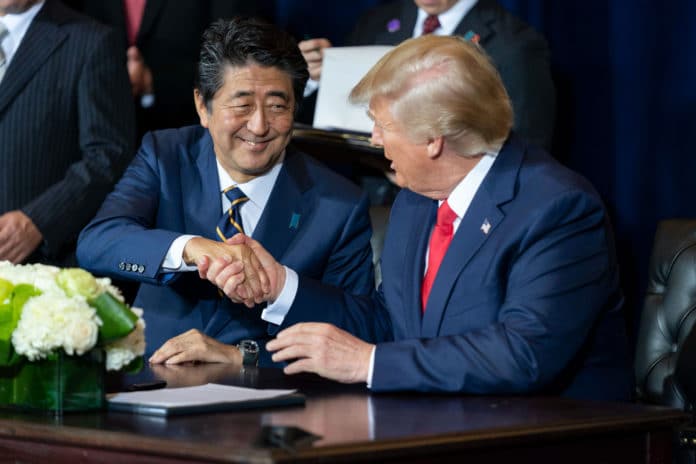
Shinzo Abe, Japan’s longest-serving prime minister and a staunch U.S. ally, was shot and killed Friday.
The 67-year-old was stumping in Nara, Japan, for the Liberal Democratic Party, when a gunman opened fire from 10 feet away with what’s been deemed a 15-inch homemade weapon.
The suspect is Tetsuya Yamagami, 41, an unemployed former member of the Japanese Navy. Yamagami reportedly told police he was frustrated with Abe and intended to kill the former leader.
Though outlets like NPR disgraced themselves with misinformation and partisanship, Abe enjoyed congenial relations with American leaders on both sides of the political aisle.
President Joe Biden called Abe “a champion of the Alliance between our nations and the friendship between our people.”
Former President Donald Trump called him “a truly great man and leader,” then added, “Few people know what a great man and leader Shinzo Abe was, but history will teach them and be kind. He was a unifier like no other, but above all, he was a man who loved and cherished his magnificent country, Japan.”
PM Shinzo Abe was a dear friend, true patriot, and a great ally to the American people. Susan and I are so saddened to hear of his death. We stand with the people of Japan in mourning his passing and celebrating his tremendous legacy.
— Mike Pompeo (@mikepompeo) July 8, 2022
Abe’s political story surrounds the rebirth of Japan as a strong player in Asia, but even more so, kick-starting his country’s moribund economy, often deemed “Abenomics.”
Believing that Japan’s post-war record of peace and economic success was something to cherish, he also stepped up patriotic education at schools for the first time in generations.
In an effort to counter China’s rogue imperialism and North Korea’s nuclear ambitions, Abe reinterpreted the Japanese constitution to allow for a stronger military. He also was an outspoken supporter of Taiwan, which irked Beijing, but led to applause in Washington. Japan, of course, has long hosted tens of thousands of U.S. troops.
“Abe had a transformational impact on Japan,” Dr. Partha Chakraborty, an expert on Asian politics, told Alpha News. “He appreciated Japan’s vulnerable position a stone’s throw from nuclear armed states, and worked assiduously within the Constitution to make her more secure. He took to heart the devastation of deflation to the country and fundamentally understood how acknowledging, and amplifying, women’s roles in the workforce will ameliorate burdens on an aging society.”
At 52, Abe became Japan’s youngest prime minister in 2006, and after a short term, returned to office in 2012, vowing to revitalize the island nation. He also helped Tokyo gain the right to host the 2020 Summer Olympics.
The scion of a prominent political family won six national elections before retiring in September 2020.
It’s notable that firearms are strictly regulated in Japan. According to the Washington Post, “anyone trying to obtain a gun in Japan needs to apply for a permit, attend a class on gun safety and laws, and pass a written test. There is a full-day training course on safe shooting and practicing techniques. There are multiple rounds of checks and verification on the gun owner’s background and health, including information about their family, mental health, personal debt, and criminal record. The gun must be registered with and inspected by police.”
A.J. Kaufman
A.J. Kaufman is an Alpha News columnist. His work has appeared in the Baltimore Sun, Florida Sun-Sentinel, Indianapolis Star, Israel National News, Orange County Register, St. Cloud Times, Star-Tribune, and across AIM Media Midwest and the Internet. Kaufman previously worked as a school teacher and military historian.











